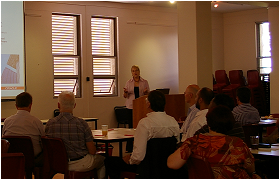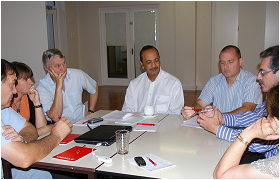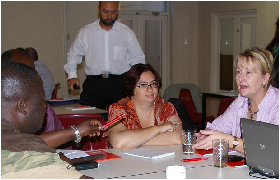By Roderick Lim Banda
www.kase.co.za
The University of Cape Town (UCT) hosted the February 2009 Academic CIO Breakfast. Our discussion topic was "Reducing the Cost of IT". As per the usual format, the conversations take place in the second part of our meeting following one or more presentations by guest speakers. The presentation is not necessarily related to the discussion topic. But in this case, it sparked some thoughts on our ongoing and related theme of skills development.
Presentation by Sonja Balt of Oracle
 Prior to the discussion, Sonja Balt of Oracle presented Oracle's program for academic institutions.
She re-iterated some of the alarming statistics in terms of gaps that needed to be addressed.
The global economic recession may cause graduates in South Africa to re-think their plans of going overseas, but
a survey indicating that up to 75% of them want to leave the country is not a healthy sign.
Prior to the discussion, Sonja Balt of Oracle presented Oracle's program for academic institutions.
She re-iterated some of the alarming statistics in terms of gaps that needed to be addressed.
The global economic recession may cause graduates in South Africa to re-think their plans of going overseas, but
a survey indicating that up to 75% of them want to leave the country is not a healthy sign.
Sonja outlined Oracle's approach of providing software, training material and support to universities in order for academics to incorporate Oracle's platforms and technologies into the academic program. This is aimed at addressing industry demand for graduates with technical skills of relevant technologies and platforms.
Is this of value to academics and how can this help the academic program of universities? Academics were quick to highlight the focus of the academic programs on theory rather than on products or tools. Discussion revolved around the application of such a program from industry to support the academic program of universities. The demand in industry for technical skills was supported by representatives of corporate enterprises. It is evident that this is going to be an ongoing discussion and that much has to be done to address the gaps. For more information on Sonja's presentation and detailed aspects of this discussions and the ongoing topic of skills development, the academic and commercial gaps, graduate and internship programs, join the social network forum below and contact us.
Talk or Action
There was also some discussion on the forum and the view that it is about people who come together to just "talk" as oppose to setting an agenda for "action". It was again a reminder that while the forum was about facilitating conversation, the gaps needed people with passion, compassion and commitment to take the initiative and to act. It is much like the business and IT chasm when neither "side" take the initiative to be proactive in filling the gaps - whatever those gaps may be. The forum is not really just about "talk" nor about setting the agenda for "action", it is about "people" and connecting and finding those individuals who have the passion and compassion to take the initiative in addressing whatever gaps exist.
The "talk" or conversation is the way we gain understanding and build up our motivation to "act". We can continue to "talk" but then fail to "act" because we maintain the perspective of our own positions as academics or representatives of industry and as professionals in commercial enterprises. As role players, we can focus internally, defend our positions and pursue our core functions - leaving the vaccuum that exists in between the external boundaries of these roles. Or we can think outside of these roles and act more dynamically as individuals. For example, when looking to bridge the gap that exists between the academic program and the industry demand for skills, we need to re-evaluate our own personal situation rather than focus on what government, industry and universities are doing.
As commercial professionals we can give of our time and effort to become part time lecturers and trainers in areas in which we specialize. We can help academics and researchers in our local universities and schools carry the load and burden in education and skills development. We need to see this as our problem, as a pre-occupation of society and not simply that of a specific group of trainers, teachers and academics. As academics, we can extend ourselves a little further to looking into making industry programs work. As representatives of industry vendors and suppliers, and as professionals of influence in public and private enterprises, we can motive for supporting local initiatives. Perhaps we can secure funding for establishing pilot programs - putting the necessary investments into making collaborative initiatives work.
How Academic and Commercial Cooperation can Help to Lower IT Costs
Following on last year's conversation around "Skills Development" and "Agile Practice", there is evidence from shared experience that the correct application of academic theory can be of benefit to commercial enterprises. Graduate programs and internships that extend theoretical understanding in universities to practical application in industry can lower costs. Academics, professionals, graduates and students working together to apply disciplines such as project management, business process management and enterprise architecture to solve real business problems can help lower costs in IT and create value.
As we entered into our group or table discussions, a number of ideas came through. Some may be obvious and well known, but the following represents a collection and summary of what the group came up with in their informal conversation. In follow up conversations and feedback, it is evident that there were some ideas that will be pursued further by participants.
 Focus on the Big Things
Focus on the Big Things
We need to cut the big costs. Using the 80/20 principle, a few areas constitute the larger percentage of costs.
We considered the main areas of capital and operational expenditure including:
Typically, enterprises spend a large percentage of their OPEX budget on salaries and maintaining software intensive systems,
while their CAPEX is spent on hardware equipment and software assets.
When focusing on reducing the cost on human resources, the focus should be on people who add value. There should be a good mix of expensive talent and cheaper skills that can be developed. Companies must be prepared to develop talent and anticipate churn or movement. They need to consider having to continually invest in growth and skills. It may be more costly to keep resources for prolonged periods where the value of skills is allowed to decrease.
Prioritization is relevant particularly with regards to selecting which projects to undertake and how to apportion capital expenditure. Here the buy versus build or solutions versus development comes into play. Much is dependent on business and IT strategy. The importance of Enterprise Architecture was emphasized and discussed and the role it plays in helping organizations make business and IT decisions. There was also discussion on ensuring focus on innovation as a means of creating value and reducing costs.
Take Emotion Out of the Equation
It was highlighted that in making IT decisions or evaluations where cost was a factor, that emotions needed to be taken out of the equation. In the example of whether or not Open Source could be leveraged to reduce costs there were different views and perspectives. An IT group director indicated that they were moving away from Open Source as the costs were prohibitive - compounded by the lack of local skills. However, another view was that Open Source was always included in the final criteria for selecting a solution. We also considered whether the implementation of ITIL added value or whether the focus should be on applying the principles of service management? What was clear was that IT decisions needed to be made without "emotional" bias.
 Create Business Value
Create Business Value
There was a recurring theme around "value" as opposed to cost, particularly in relation to creating business value from IT initiatives. It was suggested in support of focusing on the "big things" that specific business areas like Sales and Marketing and Finance needed to be given priority. Revenue generation and cost containment is critical in the economic climate of a global recession. There was discussion on the alignment of business processes and ensuring IT provided the correct value. Often the focus on business process is lost and the business benefits deminish. It was pointed out that IT tends to get caught up in the technology product and data rather than on the actual benefit to the business.
The value versus cost consideration was also emphasized by the recommendation to focus on Continous Assessment. It is important for IT to identify what was being done and whether or not this was "right" or "wrong" - touching on aspects of cost relating to quality. It was also raised that there are challenges to measuring and demonstrating value gained from aligning business and IT where there is a lack of clarity in terms of the business strategy.
Improve IT Process
In considering costs, IT leadership needs to consider efficiencies not only in the business but also internally within the IT division. Sometimes there is so much focus on the business processes that It forgets its own and then suffers from a lack of IT process. Does IT have an operating model? Is it properly equipped with the right tools and can it be effectively managed? These questions highlighted discussion points around architecture, governance, project and operational service management.
Increase IT Investment
It was also raised that the topic or question assumes we must reduce IT costs. Rather than assuming that we must reduce IT cost, we should consider increasing investment in IT to increase business value. Areas for IT investment could include potential solutions or technologies to lower costs including virtualization, cloud computing and rapid application development.
Build Partnerships
It was also recommended that companies consider building partnerships. There were discussions on reducing costs in terms of skills development and systems integration, particularly in terms of enterprise business systems and ERP implementations. Partnerships need to be developed to address areas where there is scarcity of skills and increasing complexity and specialization.
Further Topics
At the end of the discussion we considered additional topics of interest such as the Knowledge Organization and Intellectual Capital. Please feel free to contact us regarding any preferences for future forum conversations.
Hosting Workshops
Sonja enquired as to whether or not participants would benefit from workshops on specific topics and products such as Service Orientated Architecture (SOA) and Oracle Fusion. We are also collaborating on events and workshops that expand on some of the conversation points such as Enterprise Architecture, Skills Development, Business & IT Alignment and the development of the IT professional.
 Acknowledgements
Acknowledgements
Thanks again to the University of Cape Town (UCT), Mike Eccles and Michael Kyobe for organizing the venue at the Centre for African Studies in the Oppenheimer Institute at the scenic upper campus of UCT. Thanks to Sonja Balt of Oracle for her presentation. Thanks to Simeka for their continued support.